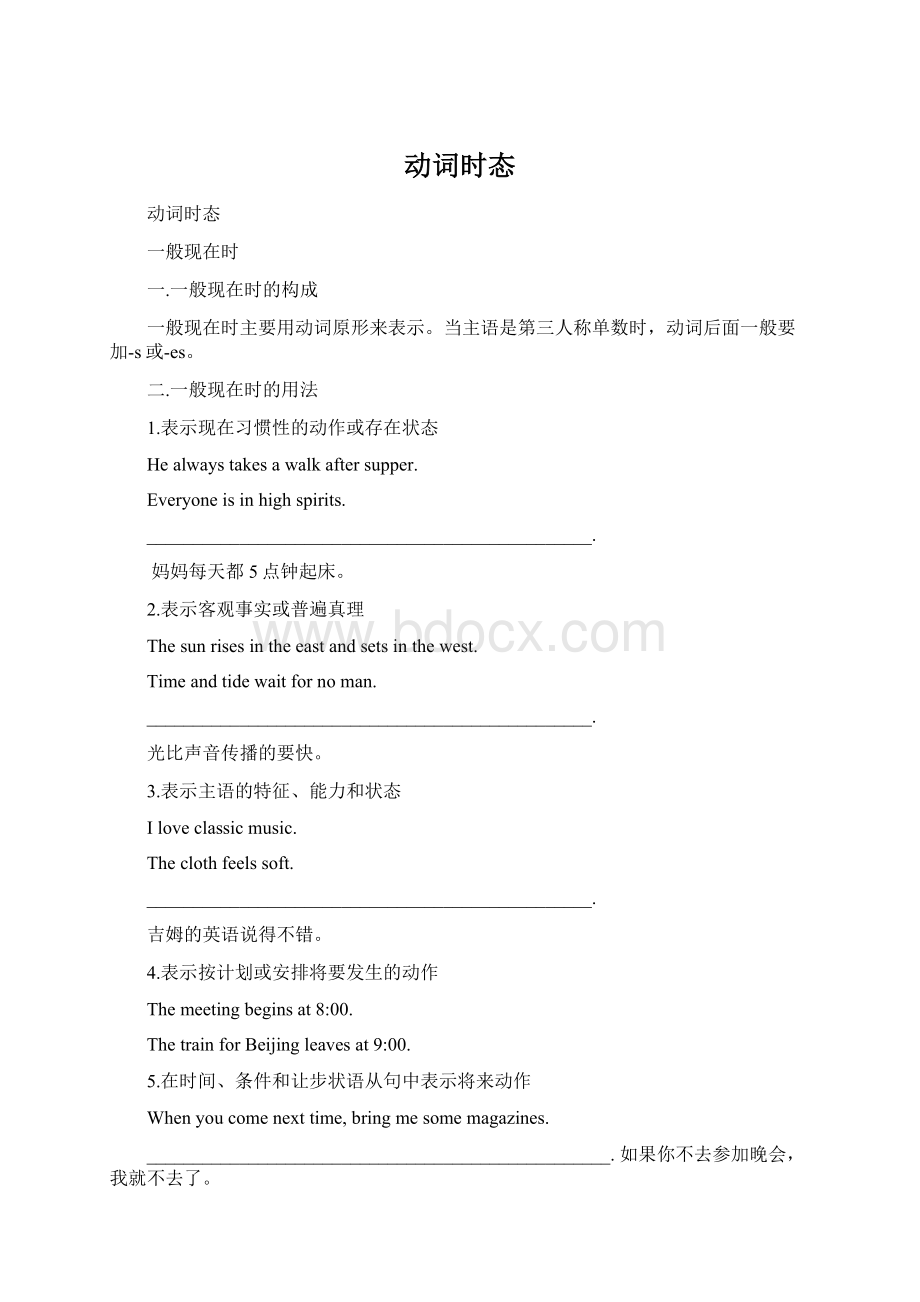动词时态Word下载.docx
《动词时态Word下载.docx》由会员分享,可在线阅读,更多相关《动词时态Word下载.docx(39页珍藏版)》请在冰豆网上搜索。

4.Lucy________(have)somefriendshere.
5.He_____________hishomeworkatschool.(notdo)
6.FangMing_____________(notlike)riceatall.
7.Doyoulike_______(ride骑)abike?
8.We_____(go)toschoolat7:
30inthemorning.
9.Maryseldom________(come)here.
10.Letme____(help)you.
单选
1Jenny____inanoffice.Herparents____inahospital.
A.work;
worksB.works;
workC.work;
areworkingD.isworking;
work
2Oneoftheboys_____ablackhat.
A.haveB.thereisC.thereareD.has
3Wewillgoshoppingifit____tomorrow.
A.don'
trainB.didn'
trainC.doesn'
trainD.isn'
train
4Hesaidthesun____intheeastand____inthewest.
A.rose;
setB.rises;
setsC.rises,setD.rise;
sets
5WangMei____musicandoften____tomusic.
A.like;
listenB.likes;
listensC.like;
arelisteningD.liking;
listen
6Jenny____Englisheveryevening.
A.hasstudyB.studiesC.studyD.studied
7.Iftheycome,we________ameeting.
A.have
B.willhave
C.had
D.wouldhave
8.Ifit________tomorrow,we’llgoroller-skating.
A.isn’train
B.won’train
C.doesn’train
D.doesn’tfine
9.Remembertosendmeaphotoofusnexttimeyou______tome.
A.arewritingB.willwriteC.haswrittenD.write
一般过去时
一.一般过去时的构成
一般过去时用动词的过去式表示。
Ididn’tsleepwelllastnight.
Iwasajuniorstudenttwoyearsago.
二.一般过去时的用法
1.表示过去某个特定时间发生的动作或存在的状态
Hesuddenlyfellillyesterday.
昨天他突然生病了。
Theengine________becausethefuel__________________.
发动机因燃料用光而停机了。
2.表示过去经常发生的动作或存在的状态
Iwrotehomeonceaweekatcollege.
我上大学时每周给家里写一封信。
注意:
表示过去的习惯性动作,除了用过去时外,还可以用或来表示。
Sheusedtostudylateintothenightwhenshewasinseniormiddleschool.
Hewouldsitforhoursdoingnothing.
3.表示过去连续发生的一系列动作
She______theroom,___________amagezineand______throughitcarefully.
她走进房间,拿起一本杂志,认真的阅读起来。
Thestudents_____________earlyinthemorning,______morningexercisesandthen_______Englishaloudintheclassroom.
学生们起床很早,做早操,然后在教室里朗读英语。
4.在时间、条件状语从句中表示过去将要发生的动作。
Wewouldnotleave__________________________________.
老师回来我们才会离开。
Shetoldmeshewouldnotgo__________________thenextday.
她告诉我如果第二天下雨的话,她就不去了。
三.具体用法
1带有确定的过去时间状语时,要用过去时
Didyouhaveapartytheotherday?
2表示过去连续发生的动作时,要用过去时。
这种情况下,往往没有表示过去的时间状语,而通过上下文来表示。
Theboyopenedhiseyesforamoment,lookedatthecaptain,andthendied.
3表示过去一段时间内经常或反复的动作。
常与always,never等连用。
Mrs.Peteralwayscarriedanumbrella.
彼得太太过去老是带着一把伞。
4如果强调已经终止的习惯时要用usedtodo(过去常常做,而现在不那样做了)
Heusedtodrink.
他过去喝酒。
(意味着他现在不喝酒了。
喝酒这个动作终止了)
5有些句子,虽然没有表示过去确定时间的状语,但实际上是指过去发生的动作或存在的状态的话,也要用过去时,这一点,我们中国学生往往出错,要特别注意!
Ididn'
tknowyouwereinParis.
我不知道你在巴黎。
(因为在说话时,我已经知道你在巴黎了。
这句话指的是说话之前,所以只能用过去时表示。
实际上,这句话暗指:
ButnowIknowyouarehere.)
1Shelivedtherebeforehe____toChina
A.cameB.comesC.comeD.coming
2I_____but_____nothing.
A.waslistened;
washearingB.listened;
heard
C.havelistened;
heardD.listened;
heardof
3Whendidyou____here?
A.gottoB.reachedC.arriveinD.reach
4I____myhomeworkat7:
00yesterdayevening.
A.finishedB.wouldfinishC.wasfinishingD.finish
5---Hedidn'
tgoshoppingwithyouyesterdayafternoon,didhe?
---_______.
A.No,hedoesn'
tB.Yes,hedidn'
tC.No,hedidD.Yes,hedid.
6When____you____supper?
A.have;
hadB.do,haveC.did,haveD.wil;
lhave
7.Mr.Mottisout.Buthe______hereafewminutesago.
A.wasB.isC.willbeD.wouldbe
8.---Hi,Tom.
---Hello,Fancy.I______youwerehere.
A.don'
tknowB.won'
tthinkC.thinkD.didn'
tknow
9.HepromisedtotellmebyhimselfwhenI______.
A.comeB.wouldcomeC.cameD.hadcome
翻译下列句子
1.我过了一个忙碌但却刺激的周末。
______________________________________butexcitingweekend.
2.上周六他们做什么了?
他们做作业和购物了。
What________they__________________Saturday?
They___________________homeworkand___________________________.
3.今天早上方方得做饭,因为昨晚他父亲不在家。
ThismorningFangfang____________________________becausehisfather_______________________yesterday.
4.他在打扫教室的时候,发现地上有块表。
Whenhe______theclassroom,he______awatchontheground.
5.他什么时候出生的?
1980年。
---When_______he_______---_______1980.
写出下列动词的过去式、过去分词形式
go
_______
enjoy
_______buy
eat
_______get
_______
walk
_______
take
write
_______study
run
_______ swim
find
begin
eat
_______play
一般将来时
一.一般将来时的构成
一般将来时是由“will\shall+动词原形”构成的。
shall只限于第一人称。
主要见于英国英语。
现在的趋势是第一、二、三人称的单复数形式均用will表示。
在口语中,和常缩写成“’ll”,紧跟在主语之后。
其否定式和的简略式分别为shan’t和won’t。
Iwillgoandshutthedoor.
Whenwillyouknowyourexamresults?
Icanseeyouarebusy,soIwon’tstaylong.
二.一般将来时的用法
1.表示将要发生的动作或存在的状态。
Ishallbefreethisafternoon.
Therewillbenochemistryclasstomorrow.
_______________________________________________.
我明年就20岁了。
2.表示将要反复发生的动作。
MyunclewillcometoseemeeverySunday.
____________________________________________________________.
本学期学生们每周要上5节英语课。
3.表示同意或答应做某事。
Thatbaglooksheavy,Iwillhelpyouwithit.
我不会告诉任何人这个秘密的。
4.表示一种倾向或推测。
Flowerswilldiewithoutwater.
没有空气人就无法生存。
三.将来时间的其他表达法
1.begoingto+动词原形
表示决定或打算要做某事
I’mgoingtobuyanewcoatthiswinter.
_____________________________________________________________.
下课后你去打篮球吗?
他长大后要当医生。
表示有迹象即将要发生什么事
Lookatthoseblackclouds.Itisgoingtorain.
______________________________________________________________.
将有一场暴风雪。
“begoingto+动词原形”与“will+动词原形”的区别
begoingto通常表示很快就要发生的事,而will\shall+动词原形既可表示不久的将来,也可表示长远的将来或不确定的将来。
Sheisgoingtogetbetter.(有恢复健康的迹象)
Shewillgetbetter.(认为最终会恢复健康的)
will表示将来,通常是指事先无计划的意图,是临时决定的;
begoingto则表示事先有计划的意图,是经过考虑的。
---Georgephonedwhileyouwereout.
---Ok.I’llphonehimback.(临时决定)
---Matthewphonedwhileyouwereout.
---Yes,Iknow.I’mgoingtophonehimback.(早有安排)
但在正式文体中,要用will来表示事先安排的动作。
Themeetingwillbeginat10:
00am.会议将在10点钟开始。
表示有迹象显示将要发生某一动作时,要用begoingto,不用will或shall。
Ifeelterrible.IthinkIamgoingtobesick.
2.be+动词-ing形式
“be+动词-ing”表示根据现在的计划或安排,预期将会发生某事,这种安排不容随意改变。
在这一结构中,动词-ing形式通常是表示位置行动的动词,如arrive,come,go,leave,move,start,stay,get以及eat,meet,die,seeoff等,并与表示将来的时间状语连用。
如果没有时间状语,则所表示的动作有即将发生之意。
HeisleavingforBeijinginafewdays.
Theoldmanisdying.
飞机马上要起飞了。
3.be+动词不定式
这一结构中的be,只有现在式(is,am,are)和过去时(was,were)两种形式。
表示按计划或安排将要发生的动作。
ThehighwayistobeopentotrafficinMay.
AmItotakeoverhiswork?
用于条件句中强调按计划或安排将要发生的动作。
Ifwearetotakethe5:
00train,wemustleavenow.
表示命令或者吩咐等,否定形式表示“禁止”或“不许”。
Youaretobebackbefore10:
00am.
_________________________________________________________________.
晚上你不能单独出去。
4.一般现在时
一般现在时也可以表示将来,主要用法有:
表示由于日历或时刻表的规定而固定不变的将来时间发生的动作。
TomorrowisFriday.
WhattimedoesthetrainleaveforParis?
在时间状语从句或条件状语从句中,用一般现在时表示将来的动作或状态。
IwillgivethebooktoyouafterIfinishit.
如果明天下雨我们就不去露营了。
在hope,suppose等后面的宾语从句中常用一般现在时表示将来的动作或状态。
Ihopeeverythinggoeswellwithhim.
()1.There__________ameetingtomorrowafternoon.
A.willbegoingtoB.willgoingtobeC.isgoingtobeD.willgotobe
()2.Charlie________herenextmonth.
A.isn’tworkingB.doesn’tworkingC.isn’tgoingtoworkingD.won’twork
()3.He________verybusythisweek,he________freenextweek.
A.willbe;
isB.is;
isC.willbe;
willbeD.is;
willbe
()4.There________adolphinshowinthezootomorrowevening.
A.wasB.isgoingtohaveC.willhaveD.isgoingtobe
()5.–________you________freetomorrow?
–No.I________freethedayaftertomorrow.
A.Are;
goingto;
willB.Are;
goingtobe;
will
C.Are;
willbeD.Are;
()6.Mother________meanicepresentonmynextbirthday.
A.willgivesB.willgiveC.givesD.give
()7.–ShallIbuyacupofteaforyou?
–________.(不,不要。
)
A.No,youwon’t.B.No,youaren’t.C.No,pleasedon’t.D.No,please.
()8.–Whereisthemorningpaper?
–I________ifforyouatonce.
A.getB.amgettingC.togetD.willget
()9.________aconcertnextSaturday?
A.TherewillbeB.WilltherebeC.TherecanbeD.Thereare
()10.Iftheycome,we________ameeting.
A.haveB.willhaveC.hadD.wouldhave
()11.He________herabeautifulhatonhernextbirthday.
A.givesB.gaveC.willgiveD.isgoingtogiving
()12.He________tousassoonashegetsthere.
A.writesB.haswrittenC.wi